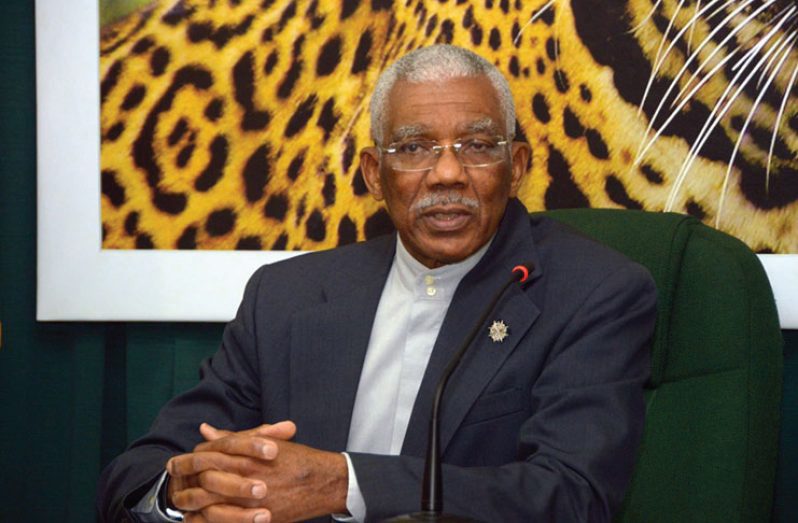…says President as he calls on Guyanese to play their part in fight against the pandemic
CONTROL measures instituted by the Government of Guyana to guard against the spread of the novel coronavirus (COVID-19), are being reviewed daily, but President David Granger believes Guyanese need to play an equal role in the fight against the dreaded disease, as measures without compliance would be futile.
There has been a consistent increase in the number of COVID-19 cases over the past two months, with the latest statistics showing that the country recorded 413 cases to date. Officials have, time and again, said the rise is due mainly to the callous behaviour of some persons, who choose to flout the control measures.
The existing measures have been promulgated by the Ministry of Public Health and published by the government in the Official Gazette.
“We adjust those measures daily… the NCTF (National COVID-19 Task Force) meets regularly and Cabinet is briefed,” said President Granger in an invited comment, on Thursday.
The President recalled that government immediately took action after Guyana recorded its first case in March. The NCTF was formed and measures were crafted and implemented, in order to mitigate the spread of the disease.
In speaking further about the situation, President Granger said: “The hinterland was almost free of COVID-19, but because people have been coming across (the border) illegally, we have seen a spike in mining and logging areas.”
Region Seven (Cuyuni-Mazaruni) and Region Nine (Upper Takutu-Upper Essequibo), which is situated close to the border with Brazil, have since been identified as the country’s COVID-19 “hotspots.”
But, in addition to illegal crossing, persons, right here, have been purposely flouting the measures, and this poses a risk to the entire population.
Government has since responded by creating the Mobile Emergency Enforcement Team, which comprises officers of the Guyana Police Force (GPF) and health personnel.
“Whenever there is a change in the situation we respond immediately…We do not want to make life uncomfortable (with control measures), but it is a fact that unless people at an individual or personal level observe those rules, the situation won’t change.
“The government cannot only enforce, we are calling on the population to observe those measures. If the measures are not observed, the population is at risk. And, only then will the government need to act,” said President Granger.
The president said government and other agencies need to engage, educate and explain what is happening, as these actions must precede enforcement. Enforcement, he believes, is the last stage, but engagement is the earlier stage.
President Granger, in his remarks at the opening of the country’s infectious disease hospital, said inescapable interconnection and interdependence of human societies increase the risks of epidemic, pandemics and global health emergencies.
International travel, legal or illegal, formal or informal, will increase the risk of transmission of human and vector-borne diseases. Epidemics are now more likely to become pandemics.
Communicable diseases exact a huge toll on human life, the economy and on social development. The COVID-19 coronavirus pandemic is expected to result in the contraction of the global economy by 5.2 per cent this year – the deepest recession recorded in over eight decades, according to the World Bank.
The economy of Latin America and the Caribbean is expected to contract by 7.2 per cent in 2020. The pandemic, also, is projected to retard long-term economic growth, reduce living standards and shrink investments, constrain international trade and increase public health expenditures.
“Sickness and deaths – consequences of pandemics – impact adversely on human capital and, particularly, on unemployment and labour productivity. The vulnerable – aged, very young and poor – are affected disproportionately, also.
“This is a dark and a difficult period. Social life has been constrained; sport has been curtailed; employment has shrunk; education has been restricted; business has contracted,” said President Granger, adding that communicable diseases have the potential to cause major disruptions to the normal way of life.
He said Guyanese have been subject to social restrictions over the past four months. These restrictions are only now being relaxed in a phased manner.
Even as authorities relax measures to some extent, there is still keen attention on the management of COVID-19 and its spill-off effects.
President Granger said public health has always been high on government’s agenda. And, this is evident in the “substantial investments” in the public health sector, over the past five years.
Expenditure moved from 3.19 per cent of nominal Gross Domestic Product (GDP) in 2014 to 4.10 per cent in 2019 and, for the corresponding period, from 9.6 per cent of total public sector expenditure to 11.32 per cent.




.png)









